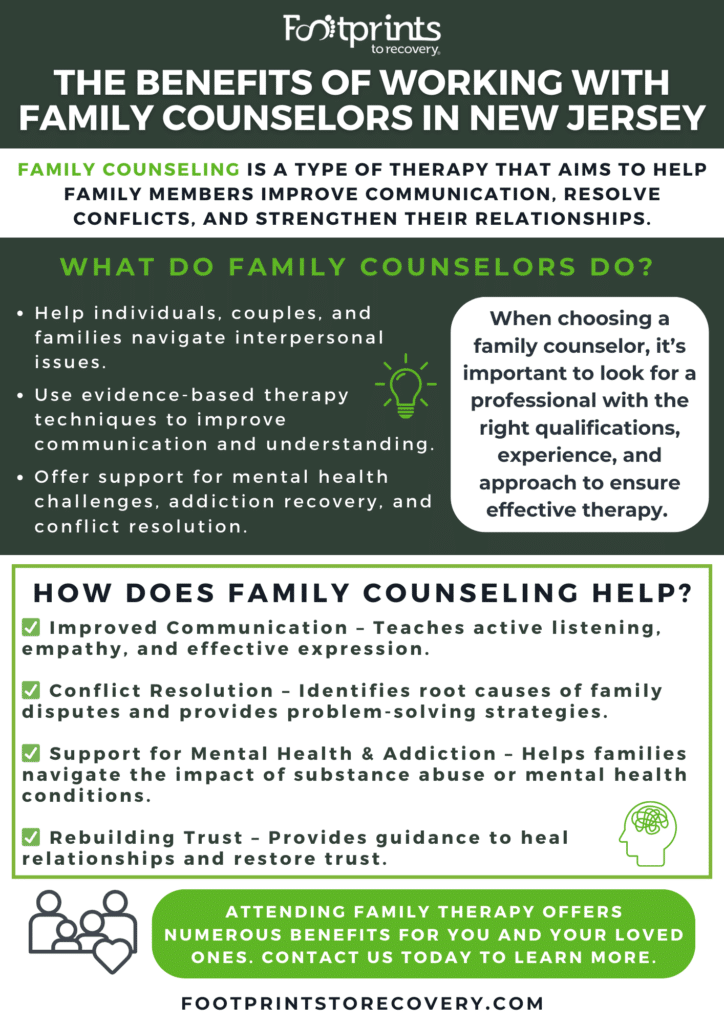Family counseling is a type of therapy that aims to help family members improve communication, resolve conflicts, and strengthen their relationships. It involves working with a trained family therapist in New Jersey who guides the family through identifying and addressing issues affecting their dynamics.
What Is a Family Counselor?
Family counselors in New Jersey are mental health professionals who specialize in helping individuals, couples, and families resolve interpersonal issues. They do this using a variety of therapy modalities (e.g., group therapy) to help participants communicate more effectively and understand each other’s needs and perspectives.
New Jersey family counseling professionals are typically required to have a master’s degree in marriage and family therapy or a related field, such as psychology or social work. While working toward their degree, they are expected to gain three years of full-time counseling experience, with at least two in marriage counseling specifically.
After that, they have to pass the Examination in Marital and Family Therapy, administered by the Association of Marital and Family Therapy Regulatory Boards (AMFTRB). As family counselors in New Jersey, they’re overseen by the New Jersey State Board of Marriage and Family Examiners.
What Is Family Counseling in New Jersey Like?
Family counseling is a collaborative therapy process that involves family members working together to address issues that impact their relationships and overall well-being. The process typically begins with an initial assessment, where a therapist meets with the family to understand their dynamics, communication patterns, and specific challenges. Sessions often involve all members of the family, though individual or smaller group meetings may be included if needed.
During counseling, the therapist facilitates open and respectful communication, helping family members express their thoughts and feelings while learning to listen to one another. The focus is on identifying unhealthy patterns, resolving conflicts, and developing healthier ways to interact. Family counseling aims to strengthen bonds, improve problem-solving, and create a supportive environment, which is particularly important when addressing issues like addiction, mental health struggles, or major life transitions.
How Does a New Jersey Family Counselor Help?
A family therapist in New Jersey can help families and couples navigate interpersonal issues and strengthen bonds with each other.
Here are some ways they can help:
Improved Communication
A common issue in families is a lack of effective communication. Family therapists in New Jersey teach communication skills that promote active listening, empathy, and respectful expression of feelings. This helps family members understand each other’s perspectives and feel heard.
Conflict Resolution
Family counselors assist families in identifying the root causes of their conflicts and guide them through strategies to resolve these disagreements. With a focus on healthy communication and problem-solving, the counselor helps family members navigate challenges without escalating tensions.
Addressing Substance Abuse or Mental Health Issues
When a family member is dealing with substance abuse or mental health challenges, a family counselor can help everyone understand the impact on family dynamics and offer support. The counselor may suggest coping strategies, treatment options, and ways for the family to help the person through their substance abuse recovery.
Rebuilding Trust
Trust is hard to build and easy to lose. A family counselor works with family members to identify the causes of mistrust, foster open dialogue, and guide them toward healing. With patience and understanding, family members can restore trust and strengthen their relationships.

"*" indicates required fields
Fill out the form below and one of our admissions team members will reach out to you:
"*" indicates required fields
Family Counseling in New Jersey: What to Expect
Suppose you’ve been referred for family counseling and have questions; fear not. Family counseling is all about improving relationships – a New Jersey family therapist is there to help you. What you need to be prepared for is to be sure the therapist has the following:
- Experience: Be sure the therapist has at least a few years of experience and training in family therapy. There are lots of psychologists out there with different specialties. In the same way, you don’t go to a pediatrician to be treated for cancer; you don’t go to a holistic therapist or general psychologist for help with family interpersonal relationships.
- A Systemic Perspective: Family therapy in New Jersey and elsewhere is all about seeing the family as a holistic system. It considers both the individuals and the effects they have on each other. The family therapist should take into consideration the welfare of all those with whom you have significant familial relationships. This depends on whether they are present in the therapy or not.
- A Strengths-based Approach: Rather than focus on what you and your family are doing wrong, a New Jersey family counselor will have you focus on what you’re doing right. This approach aims to empower family members by recognizing and building upon their existing capabilities, resources, and positive qualities.
By providing a structured environment, skilled guidance, and strategies for conflict resolution and personal growth, family therapy in New Jersey can help families develop stronger relationships and better coping skills, fostering a healthier, more supportive family dynamic.
What to Look for in a New Jersey Family Therapist
When choosing a family counselor, it’s important to look for a professional with the right qualifications, experience, and approach to ensure effective therapy. Start by ensuring the counselor is experienced in addressing the specific issues your family is facing, whether it’s addiction, mental health challenges, or communication breakdowns. A good family counselor should also use research-based approaches, like behavioral theory or cognitive-behavioral techniques, tailored to family dynamics.
Pay attention to the counselor’s communication style—they should foster a safe, nonjudgmental environment where all family members feel heard and respected. Practical considerations, such as availability, location, and cost, are also important to ensure consistent attendance. Finally, trust your instincts; a strong rapport with the counselor is essential for building trust and achieving meaningful progress as a family.
Find a Family Counselor Near Me in New Jersey
If you are struggling in your marriage due to mental health or addiction issues, Footprints to Recovery has family counselors in New Jersey ready to help you. We offer a full suite of therapy options, including family therapy, to help you repair your relationships with your loved ones. You can also take advantage of family therapy for substance abuse.
Attending family therapy at a behavioral health and addiction treatment center offers numerous benefits for you and your loved ones. Contact us today for a free consultation to learn more about the admissions process, meet our caring team, and begin your insurance verification. Take the first step towards a life free from substance abuse.




